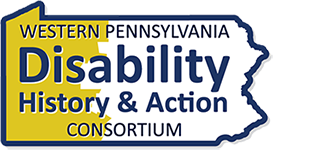In the early 1970s, a group of advocates from the Arc of Pa Allegheny County chapter visited institutions for people with intellectual and developmental disabilities across Pennsylvania. These visits resulted in advocacy to address overcrowding, use of restraints and other problems, and created momentum for Pennsylvania’s de-institutionalization movement.

In 2013, the Senator John Heinz History Center obtained a collection of correspondence, reports, photos and newspaper clippings from Bob Nelkin, who was a member of the advocacy group. Nelkin’s remarkable collection – a portion of which is now digitized and available at Historic Pittsburgh – formed the basis of a new lesson plan on disability advocacy and social justice. The lesson plan, developed by the Heinz History Center and funded by the United Way of Southwestern Pennsylvania, is available now on the Smithsonian Learning Lab.
Smithsonian Learning Lab is a free, interactive platform designed for educators and learners. It includes fully developed curriculums, complete with teacher prompts and related activities, all of which are customizable to educators and student needs.
The advocacy movement highlighted in the Learning Lab module Creating Social Change: Advocating for People with Disabilities is an example of a watershed action to champion social justice and successfully bring about reform. Using selected materials from the Nelkin collection, the module highlights the essential traits of people who work to effect change in our society. Students are asked to identify the characteristics of “change agents,” and how those traits can be developed. The lesson covers the action steps of creating change, including establishing strategies, getting attention and building momentum and holding authorities accountable. The lesson – designed for middle and high school students as well as post-secondary and adult learners – encourages engagement with primary sources to explore the larger issues of advocacy for social justice.


